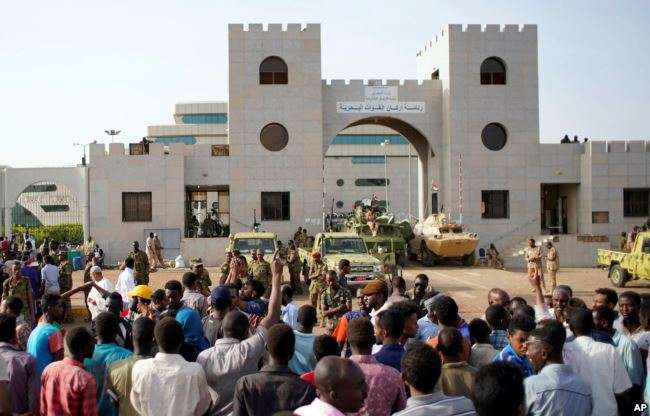Sudan's new military leader resigns
The leader of the junta that ousted Sudanese President Omar Hassan Al Bashir resigned Friday, one day after announcing the military takeover. Major General Awad Mohamed Ahmed Ibn Auf appointed Gen. Abdel-Fattah Burhan as his successor.
The military did not say why Ibn Auf is stepping down.
 Sudanese demonstrators gather to protest against the army's announcement that President Omar al-Bashir would be replaced by a military-led transitional council
Sudanese demonstrators gather to protest against the army's announcement that President Omar al-Bashir would be replaced by a military-led transitional council
Large protests continued in Sudan's capital and other cities Friday, as demonstrators rejected plans for a military-led council to run the government for up to two years.
The largest group of demonstrators gathered outside army headquarters in Khartoum, where some chanted "it fell once, it will fall again," referring to the government.
Sudan's new military rulers say they will restore civilian rule in two years or less.
 Sudanese women chant slogans during a demonstration demanding a civilian body to lead the transition to democracy
Sudanese women chant slogans during a demonstration demanding a civilian body to lead the transition to democracy
At a news conference Friday, General Omar Zein Abedeen also said military authorities will not extradite al-Bashir, who is wanted by the International Criminal Court to face charges of war crimes, crimes against humanity, and genocide. Abedeen said Sudan has laws to deal with people suspected of committing crimes in the country.
"We will not hand him over," al-Abideen said. "If you politicians want to hand him, you can do. If anybody wants to hand him over, it should not be (the military.) We have laws and courts. We can put him on trial to face justice. Sudan has laws and institutions."
The ouster of al-Bashir followed four months of mounting protests complaining about his autocratic rule and Sudan's growing economic woes.
Economic woes
Eric Reeves, a Sudan researcher and a senior fellow at Harvard University, told VOA widespread anger over Sudan's declining economy has accompanied dissatisfaction with single-party rule.
Sudan lost significant oil revenue in recent years, and its currency deteriorated in value. Inflation has gone as high as 70%, and the government slashed subsidies for fuel and bread.
Reeves said the change in leadership will not alter realities on the ground.
"This fools nobody," Reeves told VOA. “(It) addresses none of the issues, and certainly does nothing to bring about the kind of changes that will rescue the Sudanese economy from its present collapse — and it is collapsing very rapidly."
Reaction
Meanwhile, Washington is urging Sudan's new leaders to hand over power to civilians in less than two years, and the European Union called for a "swift" transfer to civilian rule.













